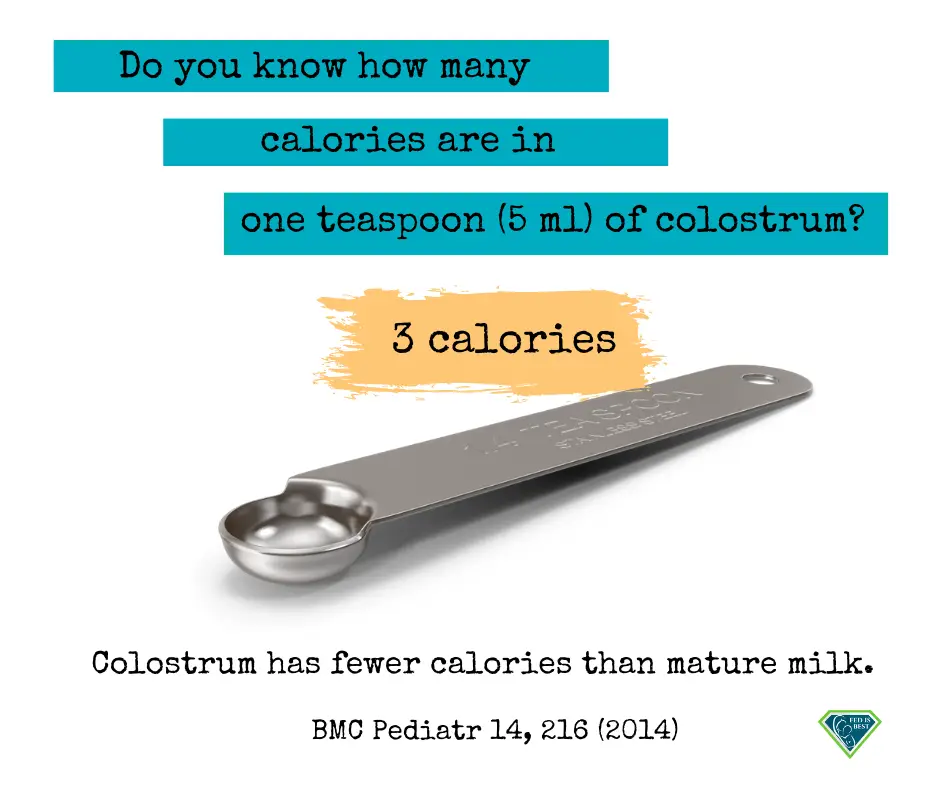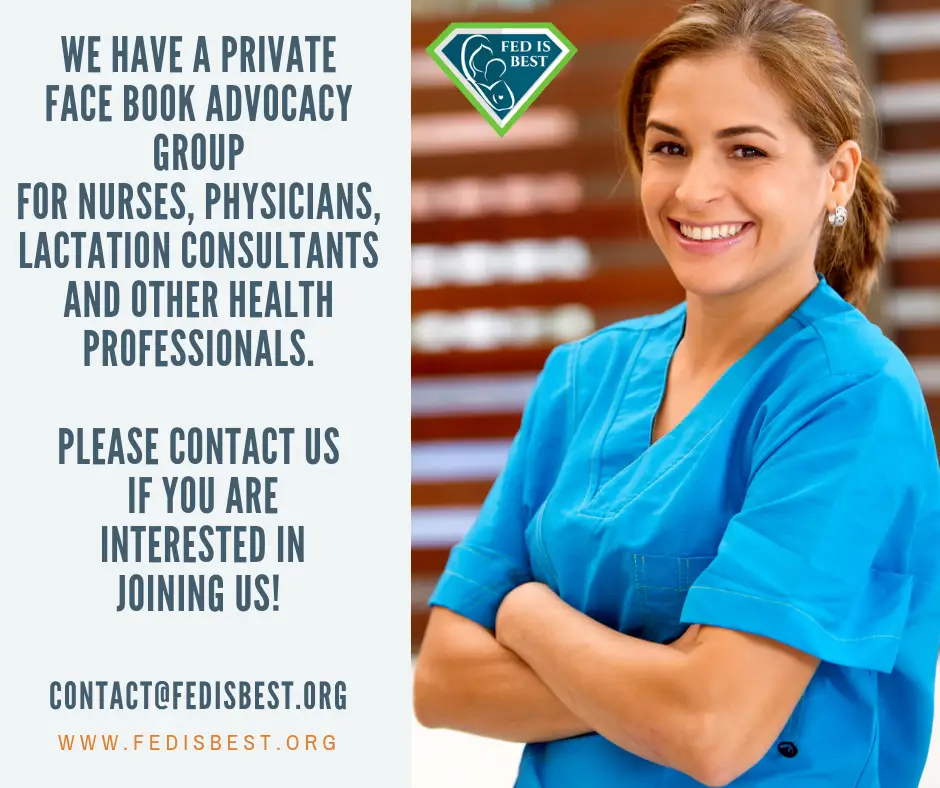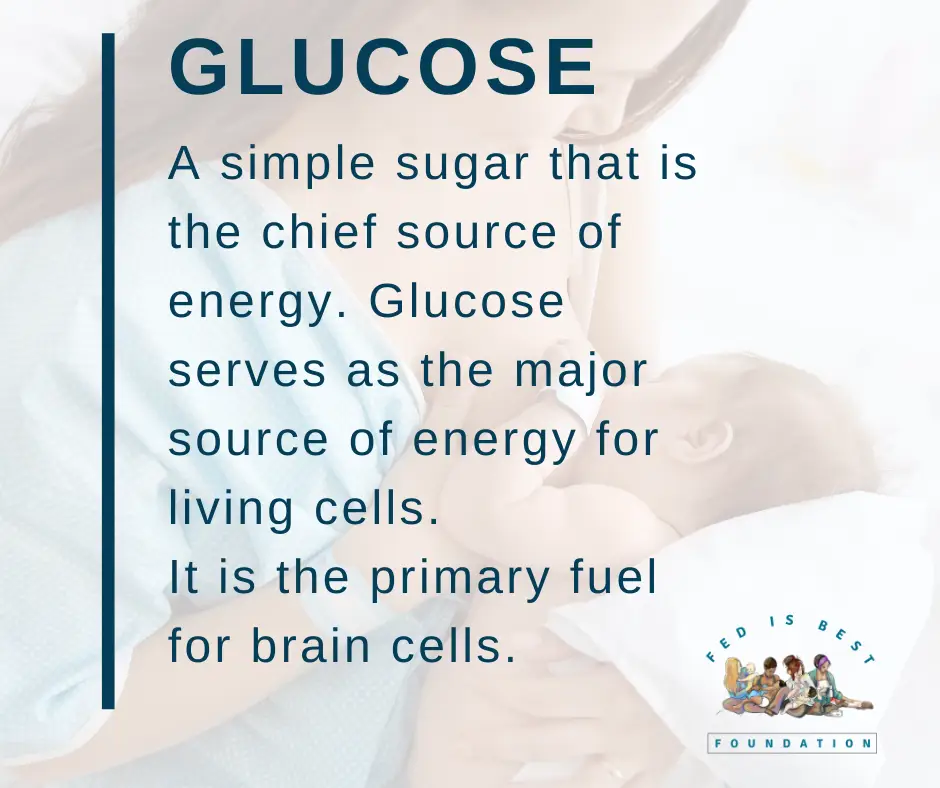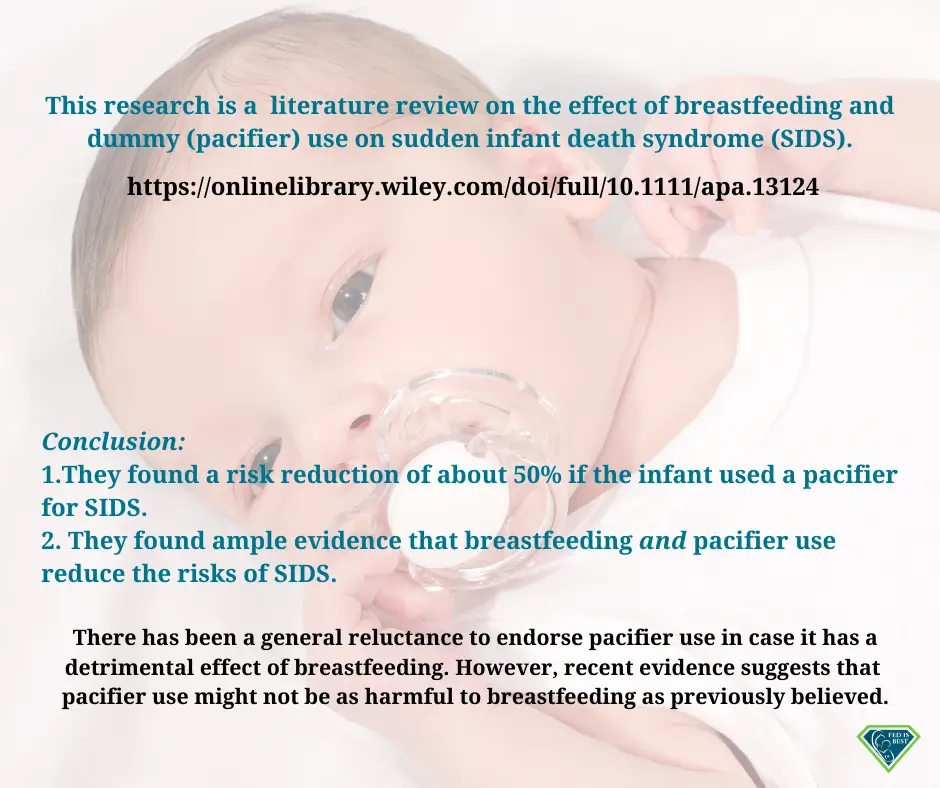Dear Parents,
It’s taken me years to find the courage to contact the Fed is Best Foundation with my experiences of working in a baby-friendly hospital. “Baby-Friendly” is the worst thing I have experienced in my 20 years as a NICU nurse. My colleagues and I have tried many times to express our concerns with the number of NICU admissions we receive. Eighty percent of our admissions are because of baby un-friendly protocols for hyperbilirubinemia, hypoglycemia, excessive weight loss, and dehydration in our hospital from insufficient breastfeeding. We are a small unit, and we have had around 150 plus admissions last year from insufficient feeding. Sadly, we’ve had bad outcomes.
Many of my colleagues are very frustrated….but others have drank the kool-aid—believing drops of colostrum are all the baby needs—which is blatantly false. The lactation nurses audit charts daily and report nurses for supplementing babies, then they go to moms’ rooms to reeducate them on the “dangers” of formula—another blatant lie. The nurses who are reported must have a counseling session with management for supposedly “overfeeding” and not following “baby-friendly” protocols.

The research shows that colostrum has fewer calories than mature milk and has only 3 calories in one teaspoon. Clearly, feeding a baby drops of colostrum is NOT enough.
FIBF: The promotion of exclusive breastfeeding has taken an irresponsible detour by demonizing formula milk in the hopes of encouraging mothers to exclusively breastfeed when for up to 15% of the population, it is not only impossible, it is unsafe. Formula milk has been depicted as a dangerous form of nutrition for babies, which is absolutely false. The intent is to shame and guilt parents for using it. Such characterization of formula as harmful and substandard puts infant lives at risk as mothers with insufficient milk have and will sometimes unwittingly starved their infants in order to meet the socially expected standard of exclusive breastfeeding, particularly if they are not informed of the harmful consequences like impaired brain development and disability.
It’s very common for hungry babies to be crying out on the postpartum floor. We are supposed to encourage “cluster feeding” (nonstop feeding at the breast) and skin-to-skin contact when they are crying, but if there isn’t enough colostrum, they just keep crying.
FIBF: The Academy Of Breastfeeding Medicine defines cluster feeding as “several short feedings close together.” However, mothers are being told constant and prolonged feeding around the clock is “cluster feeding” and this is where confusion that can result and harm begins. There is a point when cluster feeding becomes a clear sign of insufficient breast milk and/or insufficient transfer of milk and those signs must be taken seriously for the health and safety of the infant. Mothers tell us they receive conflicting information and as a result, they become very frustrated, lose confidence and want to stop breastfeeding. It is important to define what cluster feeding really is as health professionals and evaluate and intervene when an infant is in danger of insufficient feeding complications.
I encourage all of the postpartum nurses to check blood sugar (glucose) for excessive crying and unsatisfied breastfeeding, but for the most part, they don’t usually do that. Mother–baby nurses are terrified to supplement babies for fear of being audited and disciplined. It’s so sad.
FIBF: A check of their glucose, bilirubin, weight and possibly their electrolytes should be performed by a nurse, physician or nurse practitioner to assess whether a newborn is being sufficiently fed and whether supplementation is needed to protect your newborn. Research tells us that 1 in 5 mothers have delayed onset of full milk production, so we simply cannot ignore the abnormal behavior of a non-stop crying baby, knowing there will be babies who need to be supplemented.
All babies have standing orders for exclusive breastfeeding unless a mom demands formula (in which case she must be “reeducated”) or the baby has already become sick and symptomatic from insufficient feeding. Even hypoglycemic babies don’t always get supplemented; they get glucose gel and spoon-fed a couple of drops of colostrum on the floor, which just causes spikes and drops [in blood sugar levels] until the babies are finally admitted to the NICU for D10 [dextrose] bolus and PIV [IV insertion, which is painful and carries the risk of tissue damage and infection].
Pacifiers are forbidden in the mother–baby unit, and if parents bring their own, nurses and lactation consultants are to reeducate them of the “so-called dangers.”
There is no research that shows pacifiers cause nipple confusion or are detrimental to breastfeeding. Pacifiers have been shown to reduce the risks of SIDS.
This is what I commonly experience at work:
- When our supplement numbers go up, all nurses get “talked to” at shift change.
- Charts are audited each shift by the charge nurse, then reaudited regularly by lactation.
- We are required to fill out multiple forms with the nurse’s name, doctor, the reason for formula, and that reeducation was given to the mother if it is not for a specific medical condition every time we initiate formula.
- Every bottle has to be “signed out” with the patient’s name, lot number, expiration date, and reason and is tracked, just like we do with narcotics and medications.
- Sweet ease [sugar water] is locked up and requires a doctor’s order.
- We are also required to dump out anything above the recommended volume of 10 ml of formula before giving mom the bottle to make sure she does not give the baby any extra, even if they are still hungry and crying.
- Babies only get supplemented if their weight loss is >10%, even if they are showing other signs of hunger. Sadly, some health care providers have said to keep exclusively breastfeeding, despite a weight loss of greater than 10%, because “the scale was probably wrong.”
- Babies are left alone in the room with the mom, even after a surgical birth or if they are sick, because they don’t care about safety, just breastfeeding and skin-to-skin, so they can meet the insurance reimbursement breastfeeding threshold.
It is very sad that we are required to make babies physically ill before we are allowed to feed them. My advice to all parents is to bring their own ready-to-feed formula and sterile nipples for supplementing, because your baby is just a number, and only parents can protect their babies when they are crying in hunger and supplementing is needed!
-Sincerely, M. R-O. BSN, RNC-NIC
Are you a health care provider who has concerns about the Baby Friendly Hospital Initiative? We have a lare private support group to join. Click here

Hospital Drops Baby Friendly Program After Doctors Baby Was Harmed
I Dropped My Baby in a Baby-Friendly Hospital While I Was Alone Recovering from a Cesarean Section
Neonatal Nurse Practitioner Speaks Out About The Dangerous Practices Of The BFHI
NICU Nurse Discloses Newborn Admission Rates From Breastfeeding Complications in BFHI Unit
“Is Baby-Friendly Baby Safe?,” Fetus & Newborn Conference 2018
Pediatrician and Other Physician Views on the Baby-Friendly Hospital Initiative
Nurses Quit Because Of Horrific Experiences Working In Baby-Friendly Hospitals



One thought on “The Baby-Friendly Hospital Initiative is The Worst Thing I Have Experienced in my 20 Years as a NICU Nurse”